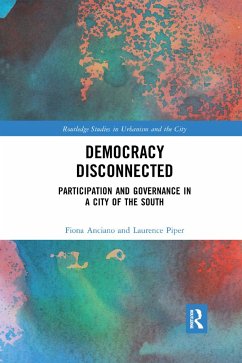
Participatory Forest Policies and Politics in India
Joint Forest Management Institutions in Jharkhand and West Bengal
Versandkostenfrei!
Versandfertig in 1-2 Wochen
20,99 €
inkl. MwSt.
Weitere Ausgaben:

PAYBACK Punkte
10 °P sammeln!
Originally published in 2004. In a radical breakaway from colonial and postcolonial policies that were based on centralized and revenue-orientated control of forests, the government of India announced the Joint Forest Management (JFM) policy resolution in 1990. JFM promised important managerial concessions, including share in cash profit from the timber harvest to forest citizens, in exchange for management of state-owned forests. The government also asked the Forest Departments to invite village councils and NGOs to take part in the joint forest management schemes. Over a decade since its inc...
Originally published in 2004. In a radical breakaway from colonial and postcolonial policies that were based on centralized and revenue-orientated control of forests, the government of India announced the Joint Forest Management (JFM) policy resolution in 1990. JFM promised important managerial concessions, including share in cash profit from the timber harvest to forest citizens, in exchange for management of state-owned forests. The government also asked the Forest Departments to invite village councils and NGOs to take part in the joint forest management schemes. Over a decade since its inception this volume examines the JFM, highlighting how state bureaucracy, local institutions and NGOs attempt to achieve the multiple goals of meeting subsistence needs, rural equity, sustainable forestry practices, and forest cover conservation. Investigating four institutions - village-based forest protection groups, the Forest Department, village councils, and NGOs - across the States of Jharkhand and West Bengal, the book focuses on forest citizens and how they interact with other JFM institutions. In doing so, it challenges notions of assumed virtues of moral economy and romanticized views of gender and indigenous knowledge and practices. The monograph also raises issues of social capital (local history, politics and leadership), common property resource (CPR) management and incentives for participation. While pointing out various inconsistencies that exist in the participatory forest framework, the book also shows the potential of JFM and suggests future directions forest management should take in India and elsewhere.














